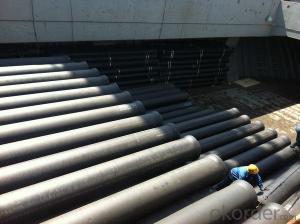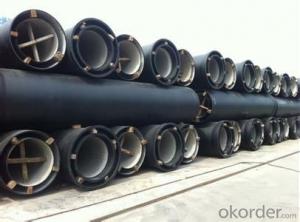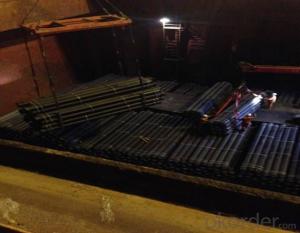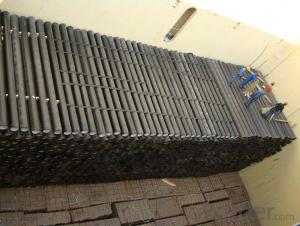DUCTILE IRON PIPE k8 DN 700
- Loading Port:
- Tianjin
- Payment Terms:
- TT OR LC
- Min Order Qty:
- -
- Supply Capability:
- 30000Tons m/month
OKorder Service Pledge
OKorder Financial Service
You Might Also Like
CNBM ductile iron pipe ranges from DN80-DN1600mm (T-Type, Class K9), effective length 6m, comply with ISO2531 Standard
Company Profile
CNBM International Corporation is the leading production base and renowned supplier of Ductile Iron Water Pipe systems of both potable and waste water in China. We are constantly looking to develop high quality products to ensure the longest service life and wonderful performance.
CNBM Pipelines regard quality as the essential factor leading to successful business. Every pipe is tested in accordance with BS EN545 (water application) or BS EN598 (sewer application). CNBM Pipelines products comply with and are tested according to the relevant European and International Standards. Our pipes are manufactured under the quality management system BS EN ISO 9001. After years of efforts, CNBM Pipelines has built up great reputation in terms of quality and service among customers worldwide
Product Introduction
CNBM ductile iron pipe ranges from DN80-DN1600mm (Tyton, T-Type, Class K7/K8/K9), effective length: 6m, complying with BS EN545/EN598/ISO2531/BS4772.
Specification& Payment terms
Internal lining: Pipes shall have an internal cement mortar lining in acc with ISO4179.
External coating: Pipes shall be externally coated with metallic zinc spray plus a further layer of resin painting to ISO8179.
Gasket: 100% SBR/NBR/EPDM gasket in accordance with ISO4633.
Packing: Pipes from DN100 to DN300 be bundled with steel belts, the others are in bulk.
Payment term: By 30% T/T advance payment + 70% Irrevocable L/C at sight.
Packing: In bulk vessel or in container.
- Q: Are ductile iron pipes prone to leakage?
- Ductile iron pipes are renowned for their leak resistance, owing to their durability and strength. Unlike PVC or cast iron pipes, this type of pipe is less susceptible to leaks. It is designed to endure high pressure and heavy loads, making it suitable for a range of applications such as water supply, sewage systems, and industrial pipelines. The leak resistance of ductile iron pipes can be attributed to their unique properties, including flexibility and shock absorption. With high tensile strength, these pipes can withstand internal and external pressure without cracking or breaking. Moreover, ductile iron pipes boast leak-proof joints. These joints are typically sealed with rubber gaskets and connected using methods like push-on joints or restrained joints with mechanical couplings. These joint designs ensure a secure and watertight connection, minimizing the risk of leaks. Nevertheless, under certain circumstances, ductile iron pipes can still experience leaks. Factors like age, corrosion, improper installation, or ground movement can contribute to leak development over time. Regular maintenance and inspections are crucial in detecting and resolving potential issues that may lead to leaks. In summary, while ductile iron pipes are generally resistant to leaks and renowned for their reliability, proper installation, regular maintenance, and timely repairs are vital to maximize their lifespan and prevent potential leaks.
- Q: What is the typical pressure rating of ductile iron pipes?
- The typical pressure rating of ductile iron pipes ranges from 150 to 350 PSI (pounds per square inch), depending on the diameter and class of the pipe.
- Q: How does ductile iron pipe perform in seismic conditions?
- Ductile iron pipe has excellent performance in seismic conditions due to its inherent flexibility and strength. It can withstand ground movements and vibrations caused by earthquakes without fracturing or breaking. Its ability to absorb and dissipate energy helps prevent catastrophic failures and ensures the integrity of the pipeline system. Additionally, ductile iron pipe's corrosion resistance and durability make it a reliable choice for long-term performance in seismic-prone areas.
- Q: How does ductile iron pipe perform in high-temperature steam applications?
- In high-temperature steam applications, ductile iron pipe performs admirably. Ductile iron, renowned for its strength and durability, possesses the capability to endure high pressures and temperatures. When subjected to high-temperature steam, ductile iron pipes retain their structural integrity and are not easily deformed or cracked. They possess a remarkable resistance to thermal expansion and contraction, rendering them suitable for situations where temperature fluctuations are common. Furthermore, ductile iron pipes exhibit exceptional corrosion resistance, a crucial characteristic in steam applications where the presence of moisture can accelerate corrosion. All in all, ductile iron pipes are a dependable choice for high-temperature steam applications, delivering enduring performance and ensuring the secure and efficient transportation of steam.
- Q: Are ductile iron pipes suitable for installation in areas with high groundwater table?
- Yes, ductile iron pipes are suitable for installation in areas with high groundwater table. Ductile iron pipes have excellent corrosion resistance and are highly durable, making them resistant to the corrosive effects of groundwater. Additionally, their strong and flexible nature allows them to withstand external pressure caused by high groundwater levels without compromising their structural integrity.
- Q: Can ductile iron pipe be used for geothermal heat exchange systems?
- Yes, ductile iron pipe can be used for geothermal heat exchange systems. Ductile iron pipe is known for its strength and durability, which makes it suitable for handling the high temperatures and pressures associated with geothermal heat exchange systems. Additionally, ductile iron pipe has excellent corrosion resistance, which is important in geothermal systems where minerals and chemicals in the ground can cause corrosion. Ductile iron pipe also has good thermal conductivity, allowing for efficient heat transfer in geothermal systems. Overall, ductile iron pipe is a reliable and cost-effective choice for geothermal heat exchange systems.
- Q: What are the typical lengths of ductile iron pipes?
- The typical lengths of ductile iron pipes range from 18 feet to 20 feet, although shorter lengths such as 10 feet or longer lengths such as 40 feet can also be found depending on specific project requirements.
- Q: Are ductile iron pipes resistant to corrosion?
- Ductile iron pipes possess resistance against corrosion, indeed. Ductile iron, a variant of cast iron, undergoes treatment with additional substances to enhance its flexibility and durability. These substances, like graphite, magnesium, and cerium, form a protective barrier on the pipe's surface, rendering it highly resistant to corrosion. Furthermore, ductile iron pipes are frequently coated with either cement mortar or a fusion-bonded epoxy coating, thereby augmenting their resistance against corrosion. This attribute renders ductile iron pipes suitable for a range of applications, including water distribution, wastewater treatment, and industrial pipelines, where corrosion is commonly encountered.
- Q: Can ductile iron pipes be used in areas with high levels of groundwater contamination?
- Areas with high levels of groundwater contamination can make use of ductile iron pipes. Ductile iron, known for its strength and durability, is resistant to corrosion, making it suitable for various environments, including those with contaminated groundwater. It provides a high level of resistance to chemicals and can withstand the corrosive effects of contaminants that may be present in the groundwater. Furthermore, ductile iron pipes possess a protective lining, further enhancing their corrosion resistance. However, it is important to consider that the suitability of ductile iron pipes in such areas relies on the specific nature and concentration of contaminants in the groundwater. Seeking advice from experts and adhering to local regulations and industry standards is essential to ensure the proper selection and installation of pipes in areas with high levels of groundwater contamination.
- Q: What is a graphite cast iron pipe?
- There is a graphite tube, but there is no graphite cast iron (if not ductile iron)
Send your message to us
DUCTILE IRON PIPE k8 DN 700
- Loading Port:
- Tianjin
- Payment Terms:
- TT OR LC
- Min Order Qty:
- -
- Supply Capability:
- 30000Tons m/month
OKorder Service Pledge
OKorder Financial Service
Similar products
Hot products
Hot Searches
Related keywords























